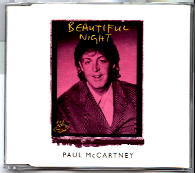
The Beatles,also referred to colloquially as the White Album,is the ninth studio album and only double album by the English rock band the Beatles,released on 22 November 1968. Featuring a plain white sleeve,the cover contains no graphics or text other than the band's name embossed. This was intended as a direct contrast to the vivid cover artwork of the band's previous LP,Sgt. Pepper's Lonely Hearts Club Band (1967). The Beatles is recognised for its fragmentary style and diverse range of genres,including folk,country rock,British blues,ska,music hall,proto-metal and the avant-garde. It has since been viewed by some critics as a postmodern work,as well as one of the greatest albums of all time. The album was the band's first LP release on their then-recently founded Apple Records after previous albums were released on Parlophone in the United Kingdom and Capitol Records in the United States.

Flaming Pie is the tenth solo studio album by English musician Paul McCartney,released on 5 May 1997 by Parlophone in the UK and Capitol Records in the US. His first studio album in over four years,it was mostly recorded after McCartney's involvement in the highly successful Beatles Anthology project. The album was recorded in several locations over two years,between 1995 and 1997,featuring two songs dating from 1992.

"Real Love" is a song written by the English musician John Lennon,formerly of the Beatles. He recorded six demos of the song in 1979 and 1980 with "Real Life",a different song that merged with "Real Love". In 1988,the sixth take was posthumously released for the documentary soundtrack Imagine:John Lennon. In 1995,his demo was completed by his former Beatles bandmates as part of the Beatles Anthology project,along with "Free as a Bird".
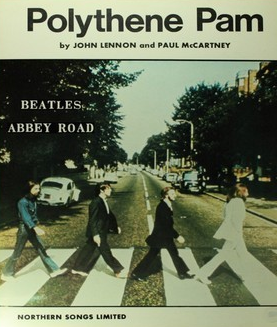
"Polythene Pam" is a song by the English rock band the Beatles from their 1969 album Abbey Road. Written by John Lennon and credited to Lennon–McCartney,it is the fourth song of the album's climactic side-two medley. The Beatles recorded the track in July 1969 as a continuous piece with "She Came In Through the Bathroom Window",which follows it in the medley.
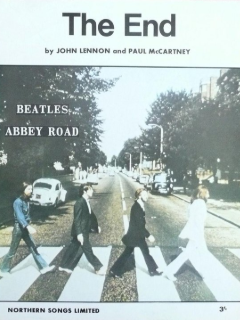
"The End" is a song by the English rock band the Beatles from their 1969 album Abbey Road. It was composed by Paul McCartney and credited to Lennon–McCartney. It was the last song recorded collectively by all four Beatles,and is the final song of the medley that constitutes the majority of side two of the album. The song features the only drum solo recorded by Ringo Starr with the Beatles.

"Oh! Darling" is a song by the English rock band the Beatles,appearing as the fourth song on their eleventh studio album Abbey Road (1969). It was written primarily by Paul McCartney and credited to Lennon–McCartney. Its working title was "Oh! Darling ". Although not issued as a single in either the United Kingdom or the United States,a regional subsidiary of Capitol successfully edited it as a single in Central America,having "Maxwell's Silver Hammer" as its B-side. It was also issued as a single in Portugal. Apple Records released "Oh! Darling" in Japan with "Here Comes the Sun" in June 1970.
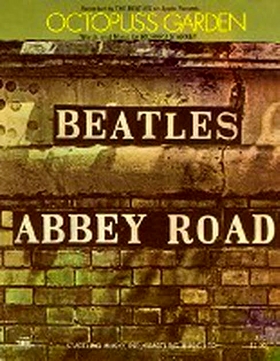
"Octopus's Garden" is a song by the English rock band the Beatles,written and sung by Ringo Starr,from their 1969 album Abbey Road. George Harrison,who assisted Starr with the song,commented:"'Octopus's Garden' is Ringo's song. It's only the second song Ringo wrote,and it's lovely." He added that the song gets very deep into the listener's consciousness "because it's so peaceful. I suppose Ringo is writing cosmic songs these days without even realising it." It was the last song released by the Beatles featuring Starr on lead vocals.

"You Never Give Me Your Money" is a song by the English rock band the Beatles. It was written by Paul McCartney,and thematically documents the personal difficulties that were facing the band. The song is the first part of the medley on side two of their 1969 album Abbey Road and was recorded in stages between May and August that year.
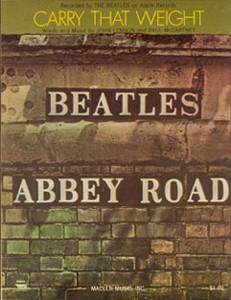
"Carry That Weight" is a song by the English rock band the Beatles from their 1969 album Abbey Road. Written by Paul McCartney and credited to Lennon–McCartney,it is the seventh and penultimate song in the album's climactic side-two medley. It features unison vocals in the chorus from all four Beatles,a rarity in their songs. It is preceded by "Golden Slumbers" and segues into "The End".

"Don't Pass Me By" is a song by the English rock band the Beatles from their 1968 double album The Beatles. A country rock song,it was the first solo composition written by drummer Ringo Starr.

"You're Going to Lose That Girl" is a song by the English rock band the Beatles from their 1965 album and film Help! Credited to the Lennon–McCartney songwriting partnership,the song was mostly written by John Lennon with contributions from Paul McCartney.

Vertical Man is the eleventh studio album by Ringo Starr,issued in 1998. The album served as Starr's attempt at a commercial comeback following the success of The Beatles Anthology project. Starr enlisted the help of many of his musician friends in making Vertical Man,including Scott Weiland,Brian Wilson,Alanis Morissette,Ozzy Osbourne,Tom Petty,Joe Walsh,Timothy B. Schmit,Steven Tyler,and his former Beatles bandmates Paul McCartney and George Harrison. Beatles engineer Geoff Emerick mixed the tracks,and Starr and Mark Hudson served as producers.

"Boys" is a song written by Luther Dixon and Wes Farrell,originally recorded by the Shirelles at Bell Sound Studios in New York City and released as the B-side of their "Will You Love Me Tomorrow" single in November 1960. It was recorded more than two years later by the Beatles and included on their debut album in the United Kingdom,Please Please Me (1963).
Oobu Joobu was a radio show created,directed and presented by Paul McCartney. It was described by McCartney as "wide-screen radio",and consisted of McCartney hosting a mix of various demos,live tracks,outtakes,rehearsals,and other unreleased material from his solo career,plus tracks by other artists that served as inspiration for McCartney,all wrapped around behind-the-scenes stories and 'chat'. The program aired in 1995 on the American radio network Westwood One,running for 15 episodes broadcast between May and September. The show's name was inspired by a BBC production of Alfred Jarry's Ubu Cocu.

"The World Tonight" is a song by Paul McCartney and is the second track on his 1997 album Flaming Pie. This song and Young Boy were featured in the 1997 movie Fathers' Day.

"Young Boy" is a song by English musician Paul McCartney,included as the fifth track on his 10th solo studio album,Flaming Pie (1997). McCartney reportedly started working on the song in August 1994. The initial tracks were recorded in February 1995 at Steve Miller's studio in Sun Valley,Idaho,and were completed in May at McCartney's home studio. This song and "The World Tonight" were featured in the 1997 movie Fathers' Day.
"Really Love You" is a song written by Paul McCartney and Ringo Starr—their first-ever shared credit—and originally released on McCartney's 1997 album Flaming Pie. In 2005,a reworked version was released as a limited edition 12" vinyl,from the album Twin Freaks.
Paul McCartney:In the World Tonight is a 1997 documentary about the making of Paul McCartney's Flaming Pie album. The film takes its name from the album's second track,"The World Tonight".
Return to Pepperland is the name given to an unfinished recording project by English musician Paul McCartney with American record producer Phil Ramone. The songs recorded during these sessions have been the basis of bootleg albums usually titled Return to Pepperland.

Give More Love is the nineteenth studio album by English musician Ringo Starr. It was recorded primarily in Starr's home studio in Los Angeles and was released on 15 September 2017 by UMe. The album features Starr's frequent collaborators such as Joe Walsh,Dave Stewart,Gary Nicholson and Bob Malone,members of his All-Starr Band,and guest appearances by Starr's former Beatles bandmate Paul McCartney.
